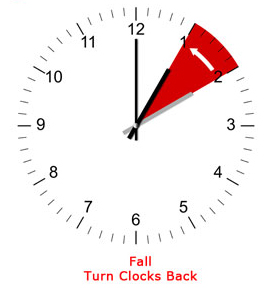Saturday November 2, 2019 ~ BC
~ West Shore Voice News
Tonight Saturday November 2 (well, technically-speaking 2 am Sunday morning November 3, 2019) could well be the last time clocks in British Columbia need to ‘fall back’.
Before heading to bed tonight it’ll be perhaps the last time in BC anyone has to remember to turn their clocks back one hour (or that most automated devices will do that without human intervention).
BC went to Daylight savings time in March 2019 when clocks were turned ahead by one hour; this weekend BC falls back to standard time (Pacific Standard Time or PST, which is eight hours behind Universal/UTC or Greenwich Mean Time).
In a timely fashion — and not to appear too ‘tricky’ by announcing it on Halloween (!) — the BC government on Thursday October 31 introduced an interpretation amendment act to allow for a future move to permanent daylight saving time (DST).

This pending change is a political move in the wake of about 93% of British Columbian respondents indicated support for the change in a record-breaking level of public engagement. It means that next spring (on March 8, 2020) it could be the last time British Columbians again forward, but then it might just stay there — with everyone one hour ahead.

There are pros and cons for darker mornings in winter as part of the tradeoff for not flipping the clock back and forth which in itself was seen as a problem for many (through disruption to routines and biological rhythms). As a sleep disrupter, the spring-forward (loss of one hour of sleep for most people each spring when clocks were turned forward one hour) was anecdotally prescribed to contributing to problems including more incidents of car accidents. Busy overloaded lifestyles are less amenable to making a forced time adjustment.
“British Columbians have said loud and clear that they want to do away with the practice of changing our clocks twice a year and our government is taking action,” said Premier John Horgan on Thursday. “This bill creates a clear path forward for the transition, while also ensuring we take into account every detail during implementation.”
The bill will amend legislation that enabled the bi-annual change from standard to daylight time and will rename the province’s time zone as Pacific Time. It will not affect the long-standing ability of certain local areas in the North and Kootenays to remain on mountain time, as they have for decades.
Saskatchewan is one province that has not used daylight savings time for decades, which has never hit the news radar. But being in synch with states to the south of the BC border seems to matter a lot more to British Columbians.
The move to year-round daylight savings time (DST) is planned to be brought into effect at a time that maintains alignment with Washington, Oregon, California and Yukon, which are all in the process of creating or enacting similar legislation. More than half (54%) of respondents in BC’s public engagement indicated it was “important” or “very important” that the province stay synchronized with neighbouring jurisdictions in its time-observance practices. However, the bill does not prevent government from forging ahead if such a move is determined to be in BC’s best interests.
Adhering to one time zone is thought to be favourable for business north-to-south (BC and northern US states) including for tourism.
“While the bill doesn’t immediately shift the province to permanent DST, it puts us in position to do so quickly,” Premier Horgan said. “This legislation is a signal to British Columbians that their collective voice has been heard and that our government is attending to every detail in preparation to do away with the biannual time change once and for all.”
The Province says that Pacific time will be seven hours behind coordinated universal time (UTC), the same difference observed during daylight saving time.
The public engagement on the proposed time zone adjustment earlier this year resulted in 223,273 completed surveys, 279 email submissions from private citizens, and 15 written submissions from organizations and experts. Across all regions, support for a change to year-round daylight savings time was over 90%. Similarly, across all industry groups and all occupational groups, except for students (a difference not explained), support for year-round observance of sticking with daylight savings time and not switching back and forth was higher than 90%.
The push for this time change started in BC a few years ago when there was a BC Liberal government.
========= More:
Final report on the daylight saving time public consultation: https://engage.gov.bc.ca/app/uploads/sites/502/2019/09/Daylight-Saving-Time-Final-Report.pdf
Read the written submissions and learn about the engagement: https://engage.gov.bc.ca/daylightsavingtime/



